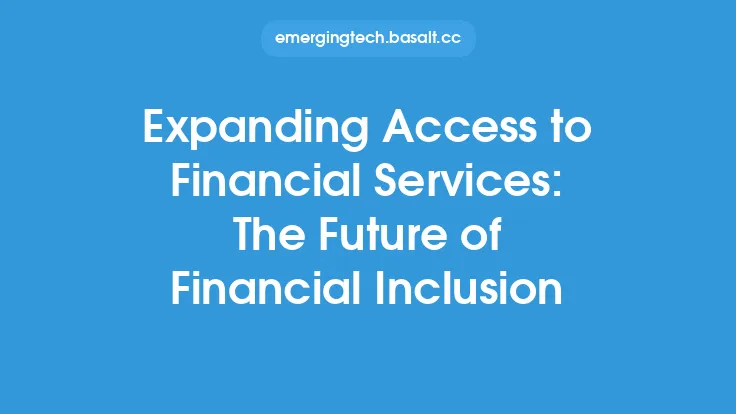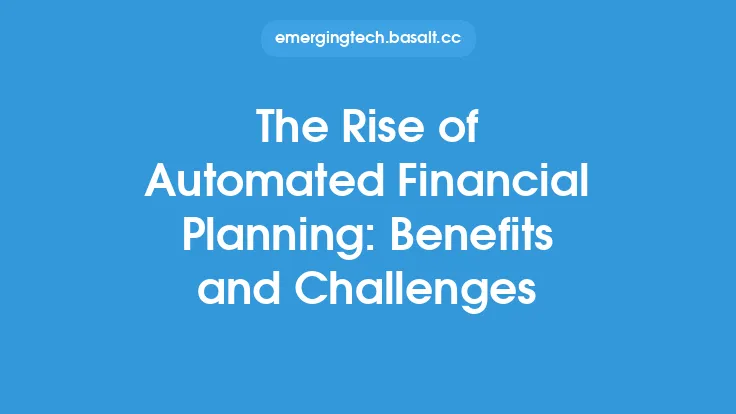The concept of financial inclusion has been a longstanding goal for economists, policymakers, and financial institutions worldwide. It refers to the ability of individuals and businesses to access basic financial services, such as banking, credit, and insurance, in a fair, transparent, and affordable manner. However, despite the progress made in recent years, millions of people around the globe remain excluded from the formal financial system, often due to geographical, socio-economic, or technological barriers. This is where Decentralized Finance (DeFi) comes into play, offering a promising solution to bridge the financial inclusion gap.
Introduction to DeFi and Financial Inclusion
DeFi is a subset of the blockchain and cryptocurrency ecosystem that focuses on creating decentralized, open-source, and transparent financial systems. By leveraging blockchain technology, DeFi aims to provide an alternative to traditional financial systems, which are often centralized, opaque, and exclusive. DeFi platforms and protocols enable users to access a wide range of financial services, including lending, borrowing, trading, and investing, without the need for intermediaries like banks or financial institutions. This decentralized approach has the potential to increase financial inclusion by providing access to financial services for underserved populations, such as the unbanked, underbanked, and those living in areas with limited financial infrastructure.
Key Characteristics of DeFi
Several key characteristics of DeFi make it an attractive solution for promoting financial inclusion. Firstly, DeFi platforms are often permissionless, meaning that anyone with an internet connection can access them, regardless of their geographical location or socio-economic status. Secondly, DeFi protocols are typically open-source, which allows for transparency, auditability, and community-driven development. Thirdly, DeFi systems often utilize smart contracts, which are self-executing contracts with the terms of the agreement written directly into lines of code. This ensures that transactions are automated, secure, and tamper-proof. Finally, DeFi platforms often have a decentralized governance structure, which enables users to participate in decision-making processes and ensures that the system is community-driven.
DeFi Use Cases for Financial Inclusion
There are several DeFi use cases that have the potential to promote financial inclusion. One example is decentralized lending, which enables individuals to borrow funds from a global pool of liquidity providers, often at more favorable interest rates than those offered by traditional financial institutions. Another example is decentralized savings, which allows users to earn interest on their deposits, often in the form of cryptocurrencies or tokens. DeFi also enables decentralized payments, which can be made quickly, securely, and at a lower cost than traditional payment systems. Additionally, DeFi platforms can provide access to decentralized insurance, which can offer protection against unforeseen events, such as natural disasters or economic downturns.
Benefits of DeFi for Financial Inclusion
The benefits of DeFi for financial inclusion are numerous. Firstly, DeFi platforms can provide access to financial services for underserved populations, which can help to reduce poverty and inequality. Secondly, DeFi systems can increase financial literacy, as users are encouraged to take an active role in managing their finances. Thirdly, DeFi platforms can promote financial stability, as they are often designed to be more resilient to economic shocks than traditional financial systems. Finally, DeFi can increase economic opportunities, as users can access new markets, products, and services that were previously unavailable to them.
Challenges and Limitations of DeFi
While DeFi has the potential to promote financial inclusion, there are also several challenges and limitations that need to be addressed. One of the main challenges is regulatory uncertainty, as DeFi platforms often operate in a gray area between traditional financial regulation and cryptocurrency regulation. Another challenge is scalability, as DeFi platforms often struggle to handle high volumes of transactions, which can lead to congestion and increased fees. Additionally, DeFi platforms can be vulnerable to security risks, such as smart contract vulnerabilities and hacking attacks. Finally, DeFi platforms often require a high level of technical expertise, which can be a barrier to entry for non-technical users.
Future Outlook for DeFi and Financial Inclusion
Despite the challenges and limitations, the future outlook for DeFi and financial inclusion is promising. As DeFi platforms continue to evolve and mature, we can expect to see increased adoption and usage, particularly in underserved markets. Additionally, the development of new technologies, such as layer 2 scaling solutions and decentralized identity protocols, is expected to improve the scalability, security, and usability of DeFi platforms. Furthermore, the growing recognition of DeFi as a legitimate financial system is expected to lead to increased regulatory clarity and cooperation, which will help to mitigate the risks associated with DeFi and promote its development. Ultimately, the potential of DeFi to promote financial inclusion is vast, and it is likely to play a major role in shaping the future of finance.





